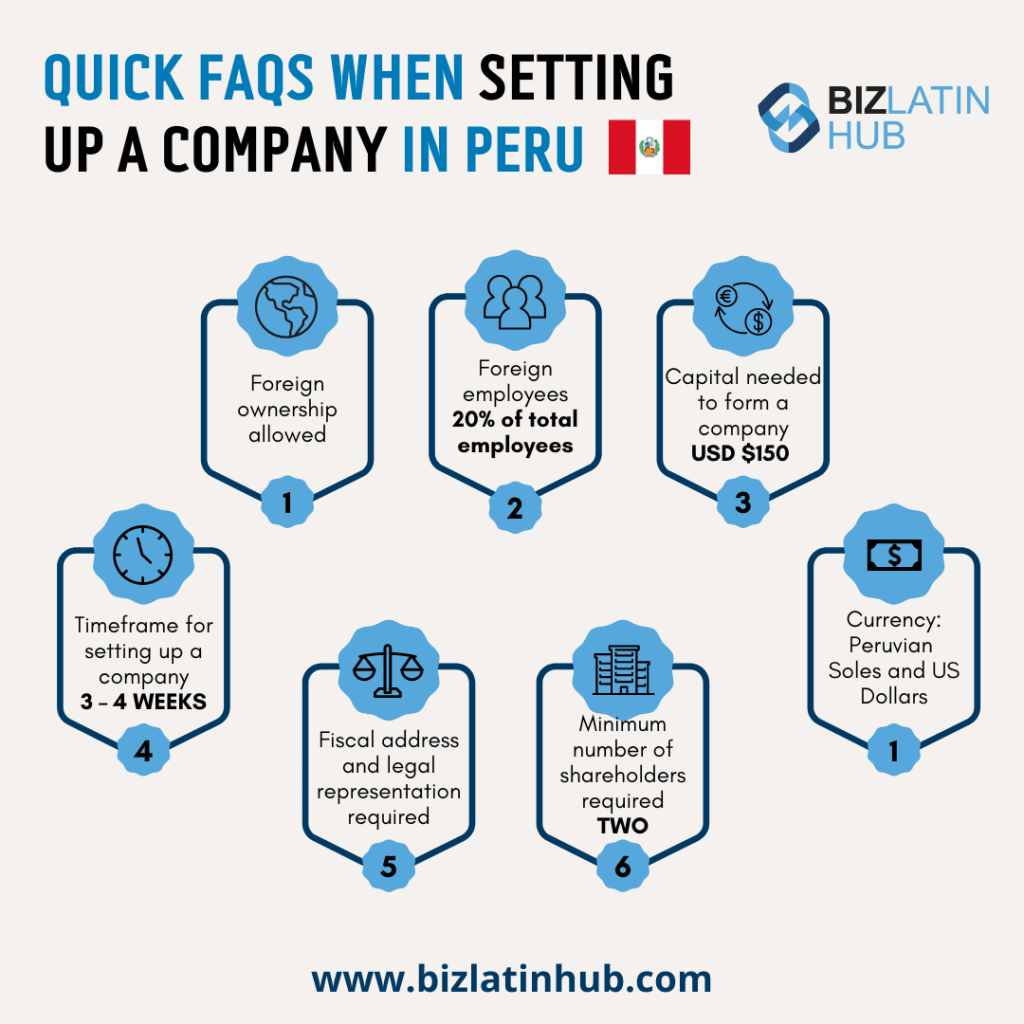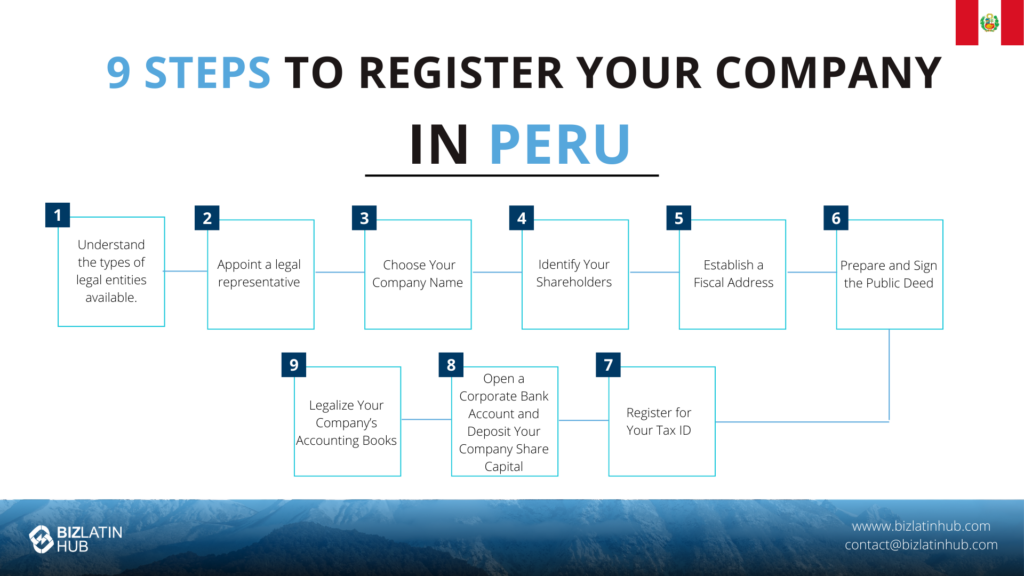The process to set up a company or corporation in Peru takes about four to six weeks. It is required to have at least two shareholders who might be individuals or a legal entity and involves preparing the minutes of incorporation. The following are the steps you should follow to form a company.
Table of Contents
Setting Up the Legal Structure for Your Company in Peru
There are a number of different legal structures you can choose from when forming your company:
• Joint Stock Company (S.A.)
• Closely Held Company (S.A.C.)
• Publicly Held Corporation (S.A.A.)
• Limited Liability Company (S.R.L.)
A Legal Representative could complete the registration of your company. In order to appoint a new legal representative you would need a Power of Attorney (POA), this POA has to be signed, and legalized by the Ministry of Foreign Affairs of Peru, and if the power is written in another language it has to be officially translated into Spanish.
6 steps to Form a Company in Peru
- Step 1: Create the Minutes of Incorporation
- Step 2: Open a Company Bank Account in Peru
- Step 3: Register Company at the National Superintendence of Public Registries (SUNARP)
- Step 4: Obtain a Tax ID (RUC – Registro Único de Contribuyente)
- Step 5: Formalize the Statutory Books
- Step 6: Obtain a Municipal License in Peru
1. Create the Minutes of Incorporation
This is the incorporation document of your company, which includes:
• Identification of Shareholders
• Description of leadership positions
• Company objective
• Bylaws
• Description
Please note that this document has to be signed by a lawyer

2. Open a Company Bank Account in Peru
You must choose a bank to open your company’s bank account. It is important to consider that in order to open an account you usually will have to make a minimum initial deposit amount in the currency of your new account (i.e. USD for a USD account and S/. for an S/. account).
3. Register the Company at the National Superintendence of Public Registries (SUNARP)
The Notary public is in charge of converting the minutes into a public deed and preparing your documents for registering in SUNARP.
To register in SUNARP you will need:
• Notary Public documents
• SUNARP forms
• Payment for the Rights to Registration
4. Obtain a Tax ID (RUC – Registro Único de Contribuyente)
The tax authority in Peru grants the Taxpayer Identification Number, which is the Superintendence of Tax Administration (SUNAT).
In order to request your Tax ID, you will need the following:
• Water or electricity bill that shows the legal address of your company, this is your address for tax purposes
• RUC Registration form (Provided by SUNAT)
• Testimony of Company Incorporation, duly registered with SUNARP
• Identification document of the Legal Representative
• Rental agreement, or ownership title, of the location where the business will operate
5. Formalize the Statutory Books
The following step to form a company in Peru is the legalization of statutory books and accounting records. The following are necessary for this step:
• Books/records to be legalized
• Copy of RUC form
• Notary Public’s Offices Rights to Registration Payment
Authorization of the Payroll Book, granted by the Ministry of Labour and Promotion of Employment:
• Payroll Book authorization application
• Copy of RUC Certificate
• Application rights payment
• Name or Legal name of Employer
• Company address
6. Obtain a Municipal License in Peru
The Municipal Operations License is required to operate for commercial, services, industrial, and professional service establishments. The respective municipality grants this, and the following steps are needed:
Certificate of Sectorisation and Compatibility of use:
• Application form
• Application Rights Permit
• Map of the area/premises of your company.
Approval from the National Institute of Civil Defense (Defensa Civil)
This is a safety inspection that grants a Certificate of Safety for your premises used:
• Compliance Certificate (This is granted by the Division of Land Registry and Municipal Authorizations)
• Copy of property title or property ownership extract
• A request addressed to the mayor
• Required payments
• Map of the area, signed by an architect
• Copy of RUC certificate
• Identification document copy of the respective party of the legal representative
• Rental agreement, or ownership title, of the location where the business will operate
• If Applicable – Copy of deed of incorporation of the legal person
• If Applicable – Copy of the authorization/certification of the respective sector

Other Cases
Other cases may include branch offices, partnerships, and joint ventures.
Branch Offices
Branch offices can be freely established by companies that are domiciled or not in Peru. The branch is to be registered in SUNARP’s Register of Legal Entities. Please note that a branch office does not have any legal status independently from its parent company.
The Branch Office’s public deed of incorporation should include, at least:
• Certificate of Good Standing of the parent company, issued by the competent authority in your country of origin
• Copy of the agreement of the creation of the branch by the board members (or the competent body of the parent company) defining capital, activities, purpose, address, legal representative, and its powers granted
• Incumbency certificate
• If Applicable – a copy of bylaws, articles of association, or equivalent in the country of origin
Partnership Agreements
Please note that a partnership agreement does not create a legal entity. It is based on the mutual interest of the parties; a partnership agreement rules the integration and participation of particular businesses and companies by which the agreement requires to be in written form.
Joint Venture
In Peru regulations for joint ventures are not standardized and may vary depending on the industry. Joint ventures allow foreign capital to enter the country by teaming up with local companies and facilitate the use of technology, access to products or services, know-how, and financing of economic activities.
If Applicable – FDI registration
Under legislation, it is obligated to register foreign investments, by which it gives the right to the investor to transfer abroad and use the most favorable buying/selling exchange rate when conducting an exchange transaction.
Common FAQs when forming a company in Peru
In our experience, these are the common questions and doubtful points of our Clients.
Yes, a business can be 100% foreign owned by either legal persons (“legal entities”) or natural persons (“individuals”).
Registering a company in Peru takes 6 weeks.
In Peru, an S.A.C means Sociedad Anónima Cerrada, which translates to “Private Closed Corporation”. This is a legal entity in Peru that mandates a minimum of two and a maximum of 20 shareholders. While a Board of Directors is not obligatory, the corporation must have a General Manager.
In Peru, an S.A.A means Sociedad Anonima Abierta, which translates to “Public Corporation”. This type of legal entity is suitable for companies with a considerable number of shareholders. To establish this entity, an initial public offering is required. Specifically, the company needs to have more than 750 shareholders. This structure is designed to accommodate companies with a large and diverse shareholder base.
In Peru, both the Sociedad Anónima Abierta (S.A.A.) and the Sociedad Anónima Cerrada (S.A.C.), are limited liability companies.
A. Shareholders: In a Private Close Corporation (S.A.C), the minimum number of shareholders is 2, and the maximum is 20. Conversely, a Public Corporation (S.A.A) requires a minimum of 750 shareholders.
B. Capital Stock: In a Private Close Corporation (S.A.C), the capital stock is determined by the contributions of each shareholder. In a Public Corporation (S.A.A) over 35% is owned by 175 or more shareholders.
C. Registration: Both S.A.A. and S.A.C. must register with the Superintendencia del Mercado de Valores (SMV) and adhere to specific legal requirements, including the regular submission of audited financial statements.
D. Company Size: S.A.A.’s are generally better suited for larger companies seeking financing in the securities markets and willing to comply with associated disclosure and regulatory obligations. On the other hand, S.A.C.’s are more appropriate for smaller companies aiming to retain control over a limited group of shareholders.
Do You Want to Set Up a Company or Corporation in Peru?
Once you have your business setup, registered, legal representation, and you have your tax and accounting in order, then you are ready to do business in Peru.
If you have any questions or enquiries about how to set up a company or corporation in Peru, our Peruvian business experts have created a company formation presentation. We hope it helps! If you have any more questions about how to incorporate your company in Peru, please do not hesitate to contact us now. Our Biz Latin Hub team in Peru includes local and expat professionals who have the knowledge and expertise to support you throughout the process.

The information provided here within should not be construed as formal guidance or advice. Please consult a professional for your specific situation. Information provided is for informative purposes only and may not capture all pertinent laws, standards, and best practices. The regulatory landscape is continually evolving; information mentioned may be outdated and/or could undergo changes. The interpretations presented are not official. Some sections are based on the interpretations or views of relevant authorities, but we cannot ensure that these perspectives will be supported in all professional settings.